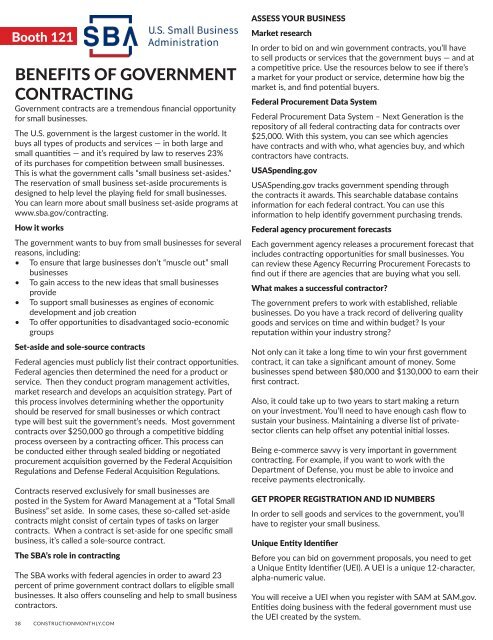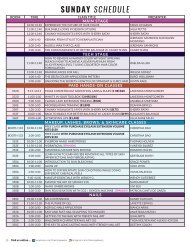Dallas2023_BuyersGuide_PRINT
You also want an ePaper? Increase the reach of your titles
YUMPU automatically turns print PDFs into web optimized ePapers that Google loves.
Booth 121<br />
BENEFITS OF GOVERNMENT<br />
CONTRACTING<br />
Government contracts are a tremendous financial opportunity<br />
for small businesses.<br />
The U.S. government is the largest customer in the world. It<br />
buys all types of products and services — in both large and<br />
small quantities — and it’s required by law to reserves 23%<br />
of its purchases for competition between small businesses.<br />
This is what the government calls “small business set-asides.”<br />
The reservation of small business set-aside procurements is<br />
designed to help level the playing field for small businesses.<br />
You can learn more about small business set-aside programs at<br />
www.sba.gov/contracting.<br />
How it works<br />
The government wants to buy from small businesses for several<br />
reasons, including:<br />
• To ensure that large businesses don’t “muscle out” small<br />
businesses<br />
• To gain access to the new ideas that small businesses<br />
provide<br />
• To support small businesses as engines of economic<br />
development and job creation<br />
• To offer opportunities to disadvantaged socio-economic<br />
groups<br />
Set-aside and sole-source contracts<br />
Federal agencies must publicly list their contract opportunities.<br />
Federal agencies then determined the need for a product or<br />
service. Then they conduct program management activities,<br />
market research and develops an acquisition strategy. Part of<br />
this process involves determining whether the opportunity<br />
should be reserved for small businesses or which contract<br />
type will best suit the government’s needs. Most government<br />
contracts over $250,000 go through a competitive bidding<br />
process overseen by a contracting officer. This process can<br />
be conducted either through sealed bidding or negotiated<br />
procurement acquisition governed by the Federal Acquisition<br />
Regulations and Defense Federal Acquisition Regulations.<br />
Contracts reserved exclusively for small businesses are<br />
posted in the System for Award Management at a “Total Small<br />
Business” set aside. In some cases, these so-called set-aside<br />
contracts might consist of certain types of tasks on larger<br />
contracts. When a contract is set-aside for one specific small<br />
business, it’s called a sole-source contract.<br />
The SBA’s role in contracting<br />
The SBA works with federal agencies in order to award 23<br />
percent of prime government contract dollars to eligible small<br />
businesses. It also offers counseling and help to small business<br />
contractors.<br />
38 CONSTRUCTIONMONTHLY.COM<br />
ASSESS YOUR BUSINESS<br />
Market research<br />
In order to bid on and win government contracts, you’ll have<br />
to sell products or services that the government buys — and at<br />
a competitive price. Use the resources below to see if there’s<br />
a market for your product or service, determine how big the<br />
market is, and find potential buyers.<br />
Federal Procurement Data System<br />
Federal Procurement Data System – Next Generation is the<br />
repository of all federal contracting data for contracts over<br />
$25,000. With this system, you can see which agencies<br />
have contracts and with who, what agencies buy, and which<br />
contractors have contracts.<br />
USASpending.gov<br />
USASpending.gov tracks government spending through<br />
the contracts it awards. This searchable database contains<br />
information for each federal contract. You can use this<br />
information to help identify government purchasing trends.<br />
Federal agency procurement forecasts<br />
Each government agency releases a procurement forecast that<br />
includes contracting opportunities for small businesses. You<br />
can review these Agency Recurring Procurement Forecasts to<br />
find out if there are agencies that are buying what you sell.<br />
What makes a successful contractor?<br />
The government prefers to work with established, reliable<br />
businesses. Do you have a track record of delivering quality<br />
goods and services on time and within budget? Is your<br />
reputation within your industry strong?<br />
Not only can it take a long time to win your first government<br />
contract, it can take a significant amount of money. Some<br />
businesses spend between $80,000 and $130,000 to earn their<br />
first contract.<br />
Also, it could take up to two years to start making a return<br />
on your investment. You’ll need to have enough cash flow to<br />
sustain your business. Maintaining a diverse list of privatesector<br />
clients can help offset any potential initial losses.<br />
Being e-commerce savvy is very important in government<br />
contracting. For example, if you want to work with the<br />
Department of Defense, you must be able to invoice and<br />
receive payments electronically.<br />
GET PROPER REGISTRATION AND ID NUMBERS<br />
In order to sell goods and services to the government, you’ll<br />
have to register your small business.<br />
Unique Entity Identifier<br />
Before you can bid on government proposals, you need to get<br />
a Unique Entity Identifier (UEI). A UEI is a unique 12-character,<br />
alpha-numeric value.<br />
You will receive a UEI when you register with SAM at SAM.gov.<br />
Entities doing business with the federal government must use<br />
the UEI created by the system.
















